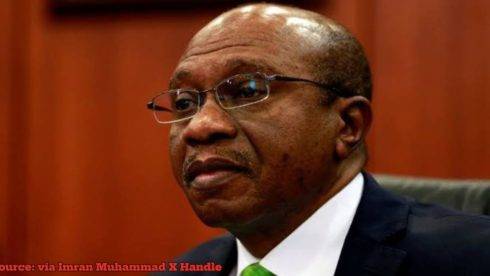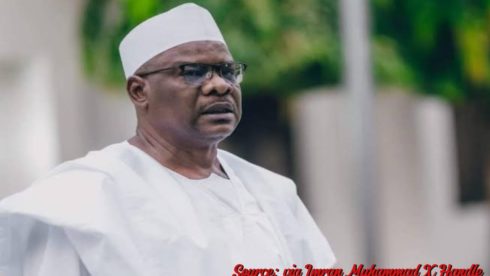Godwin Emefiele, the former Governor of the Central Bank of Nigeria (CBN) experienced the probe conducted by the Ways and Means committee uncovered alarming irregularities surrounding the allocation and utilization of N30 trillion, with particular focus on his actions. In 13 separate instances, Emefiele authorized billions of naira, raising serious concerns regarding procedural adherence and the legality of such transactions. Led by Isah Jibrin, the committee engaged in an intensive session with the CBN team, spearheaded by Deputy Governor Bala Bello, to scrutinize these discrepancies further.
During the session, Jibrin emphasized the departure from established protocols as Emefiele signed off on significant amounts of money across various documents without proper authorization. This breach highlighted the urgent necessity for a comprehensive investigation into the management and utilization of funds within the Ways and Means account, particularly under the preceding administration. The findings underscore the importance of ensuring transparency and accountability in financial governance to uphold public trust and safeguard against potential misuse of resources.
Role of Committee of Governors and Godwin Emefiele’s Actions
In an unprecedented revelation, an ad hoc committee has unearthed a significant discrepancy within the established protocol governing the signatories to the Ways and Means account. Jibrin, a prominent member of the committee, asserted that the Committee of Governors was designated to supervise such transactions. However, the direct involvement of Godwin Emefiele as the signatory in numerous instances has starkly contradicted this protocol, raising serious concerns regarding accountability and oversight. Godwin Emefiele’s authorization of billions of naira across 13 different locations has brought to light the alarming lack of transparency in the allocation process, prompting the committee to stress the imperative of elucidating the extent of his actions and determining the total figure involved in the Ways and Means transactions.
This revelation has not only exposed glaring irregularities but has also underscored the urgent need to reassess the governance structure surrounding financial decisions. The committee’s findings have magnified the necessity of implementing robust mechanisms to prevent similar deviations from established protocols in the future. By addressing these deficiencies and enhancing accountability measures, stakeholders can fortify the integrity of financial processes and uphold the principles of transparency and responsible governance, thereby ensuring the sound management of public funds.
Godwin Emefiele’s Lack of Due Process and Legal Implications
The committee’s findings raised concerns about the absence of due process in the allocation and utilization of the N30 trillion Ways and Means loan. Godwin Emefiele’s unilateral approval of funds without proper authorization underscored systemic flaws in governance and financial management within the CBN.
Moreover, the legality of Godwin Emefiele’s actions came into question, as they appeared to contravene established procedures. The committee’s inquiry aimed to ascertain the legal implications of such irregularities and hold responsible parties accountable for their actions. This development highlighted the imperative for stricter oversight mechanisms and adherence to regulatory frameworks to prevent abuse of financial authority in the future.
Calls for Transparency and Accountability
In light of the revelations regarding Godwin Emefiele’s actions and the irregularities surrounding the Ways and Means account, there were growing calls for transparency and accountability within Nigeria’s financial institutions. The committee’s efforts to uncover the truth behind the unauthorized allocation of funds underscored the importance of transparency in governance.
Stakeholders expressed the need for thorough investigations and swift actions to address the identified discrepancies and restore public trust in the financial system. The committee’s commitment to uncovering the truth and holding responsible parties to account reflected a broader societal demand for transparency and integrity in public institutions.
Godwin Emefiele’s Response and Defense
Following the disclosure of his involvement in the unauthorized allocation of funds, Godwin Emefiele issued a response defending his actions. Godwin Emefiele reiterated his commitment to the integrity of the financial system and denied any wrongdoing in his capacity as the former Governor of the CBN.
Godwin Emefiele emphasized the necessity of flexibility in managing the country’s monetary policy and asserted that his actions were within the bounds of his mandate. However, his defense did little to quell concerns about the lack of oversight and accountability in the allocation process, prompting further scrutiny from the committee and the public.
Investigations and Reforms
As the ad hoc committee continued its investigation into the irregularities surrounding the Ways and Means account, there were calls for comprehensive reforms to strengthen governance and oversight mechanisms within the CBN. The committee’s findings highlighted systemic weaknesses that needed urgent attention to prevent similar lapses in the future.
Efforts to enhance transparency, accountability, and adherence to due process were deemed essential to restoring public trust and confidence in Nigeria’s financial institutions. The committee’s ongoing work underscored the imperative for collaborative efforts between policymakers, regulators, and stakeholders to institute meaningful reforms and uphold the integrity of the financial system.
Table of Contents
Discover more from OGM News NG
Subscribe to get the latest posts sent to your email.













